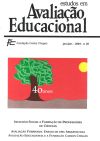Avaliação formativa: ensaio de uma arqueologia.
DOI:
https://doi.org/10.18222/eae02920042158Keywords:
Avaliação Formativa, Estruturalismo, Sistemismo, TecnicismoAbstract
Neste texto ensaia-se a elaboração de uma arqueologia do discurso da avaliação formativa, considerando-se os enunciados mais recorrentes no âmbito da escola pública do Estado do Rio de Janeiro. A intenção é dar visibilidade às unidades deste discurso em termos de continuidade entre suas irrupções, bem como examinar a existência de um discurso que seja o mesmo em qualquer acepção, e investigar a que tipos de leis obedecem e se correspondem de fato à avaliação formativa. Foram considerados os enunciados presentes no estruturalismo, nos sistemas cibernéticos e no tecnicismo. O esforço empreendido revela a dispersão existente e as possíveis opções de filiações metodológicas, recomendando-se que qualquer prática de avaliação formativa seja precedida de muita cautela e sejam aprofundadas reflexões, em função de seu tom conservador e da falta de alternativas ao desenvolvimento das teorias de currículo pós-críticas e de por em xeque o poderDownloads
Downloads
Published
How to Cite
Issue
Section
License
Authors who publish in this journal agree to the following terms:
a. Authors retain the copyright and grant the journal the right to first publication, with the paper simultaneously licensed under the Creative Commons Attribution license that allows the sharing of the paper with acknowledgment of authorship and initial publication in this journal.
b. Authors are authorized to assume additional contracts separately, for non-exclusive distribution of the version of the paper published in this journal (for example publishing in institutional repository or as a book chapter), with acknowledgment of authorship and initial publication in this journal.
c. Authors are allowed and encouraged to publish and distribute their paper on-line (for example in institutional repositories or on their personal page) at any moment before or during the editorial process, as this can generate productive changes, as well as increase the impact and citation of the published paper (See The Effect of Open Access).





